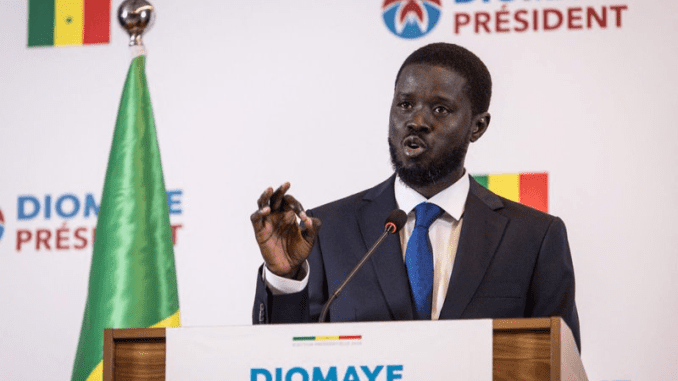
With his opponent conceding the race, anti-establishment challenger Bassirou Diomaye Faye became the youngest president in Senegal’s history on Monday, causing a political upheaval in the West African country. For the 44-year-old, who was only released from prison ten days prior to Sunday’s election—the results of which are still pending—it is an incredible victory.
This is the first time an opposition candidate has won the first round of voting in the twelve presidential elections conducted under universal suffrage since Senegal separated from France in 1960. Amadou Ba, 62, his principal rival from the ruling coalition, called Faye to congratulate him on his victory.
Congratulations were extended to him by outgoing president Macky Sall, who declared “a victory for Senegalese democracy” and chose not to run for office following victories in 2012 and 2019.
Faye has pledged to renegotiate gas and oil contracts and to promote left-wing pan-Africanism. Later this year, Senegal is expected to begin producing from newly discovered oil and gas deposits.
Since the vote, which came after three years of turmoil and a political crisis, the opposition candidate has never held a position of national election authority and has not made a public appearance.
“When you see what is happening in this country in terms of corruption and non-respect of the law, people are hungry for change,” El Hadji Mamadou Mbaye, a researcher and lecturer in political science at the University of Saint-Louis, told AFP.
Mbaye continued, mentioning the fiery opposition leader who was disqualified from contesting but supported Faye to succeed him, Ousmane Sonko, as the one who best personified the long-desired change.
Provisional results from individual polling stations, released by the local media and on social media, showed that Faye had clearly outperformed previous prime minister Ba.
We anticipate official results before the end of this week. A first-round victory required an absolute majority.
Faye had already been congratulated on newspaper top pages. “Happy Birthday, Mister President,” the Walf Quotidien wished Faye on her birthday, which falls on Monday. Late on Sunday, hundreds of ecstatic Faye fans gathered at his campaign offices in Dakar, the country’s capital.
It’s a complete transformation. Everything will alter. Everything is going to change in terms of behavior, society, and finances, according to musician Coumba Diallo, often known as Queen Biz.
Based on preliminary results released by the media earlier on Monday, at least ten of the seventeen presidential contenders congratulated Faye.
Notwithstanding three years of periods of turmoil and an abrupt postponement of the election, no significant incidents were reported during the voting process.
Significant Alteration
On March 14, Faye and Sonko were released from prison in accordance with a hastily enacted amnesty statute.
On suspicion of being involved in a standoff between Sonko and the state, he was imprisoned last year. Sonko’s conviction for defamation prevented him from participating in the presidential election.
The anti-establishment contender has vowed to combat corruption, restore the nation’s “sovereignty,” and divide riches more fairly.
In addition, he has pledged to renegotiate agreements with foreign firms on mining, gas, and oil.
When casting his ballot on Sunday, Faye declared, “I remain confident about the choice for the change that I am able to embody better than any other candidate.”
Ba presented himself as the president-elect’s heir apparent.
In a nation where half of the population is under 20, both candidates positioned themselves as the greatest choice for young voters.
– Delay
Senegal was supposed to vote on February 25, but Sall abruptly postponed it at the last minute, sparking the deadliest political crisis in decades and bloody clashes that claimed four lives.
Of Senegal’s 18 million inhabitants, about 7.3 million were able to cast ballots.
The election was keenly watched since the nation is seen as a model of democracy in coup-hit West Africa, where Russia is gaining power.
Since Senegal’s independence, this is the country’s third democratic transition of power between elected leaders.
There were hundreds of observers there from the European Union, the African Union, the ECOWAS regional body, and civil society.
Malin Bjork, the director of the EU delegation, reported that voting had happened “calmly, efficiently and (in a) very orderly manner”.
Following weeks of uncertainty, Sall was compelled to reschedule the vote from December to March 24 by Senegal’s highest constitutional court, which overruled his request to postpone it until then. This resulted in a hurried campaign that coincided with the Muslim month of Ramadan.
Sall left behind a legacy of mass arrests, enduring poverty, 20 percent unemployment, and thousands of migrants risking their lives every year to reach Europe.
Since 2021, there have been several unrest episodes that resulted in hundreds of arrests and dozens of deaths, some of which were caused by the standoff between Sonko and the state.
Leave a Reply